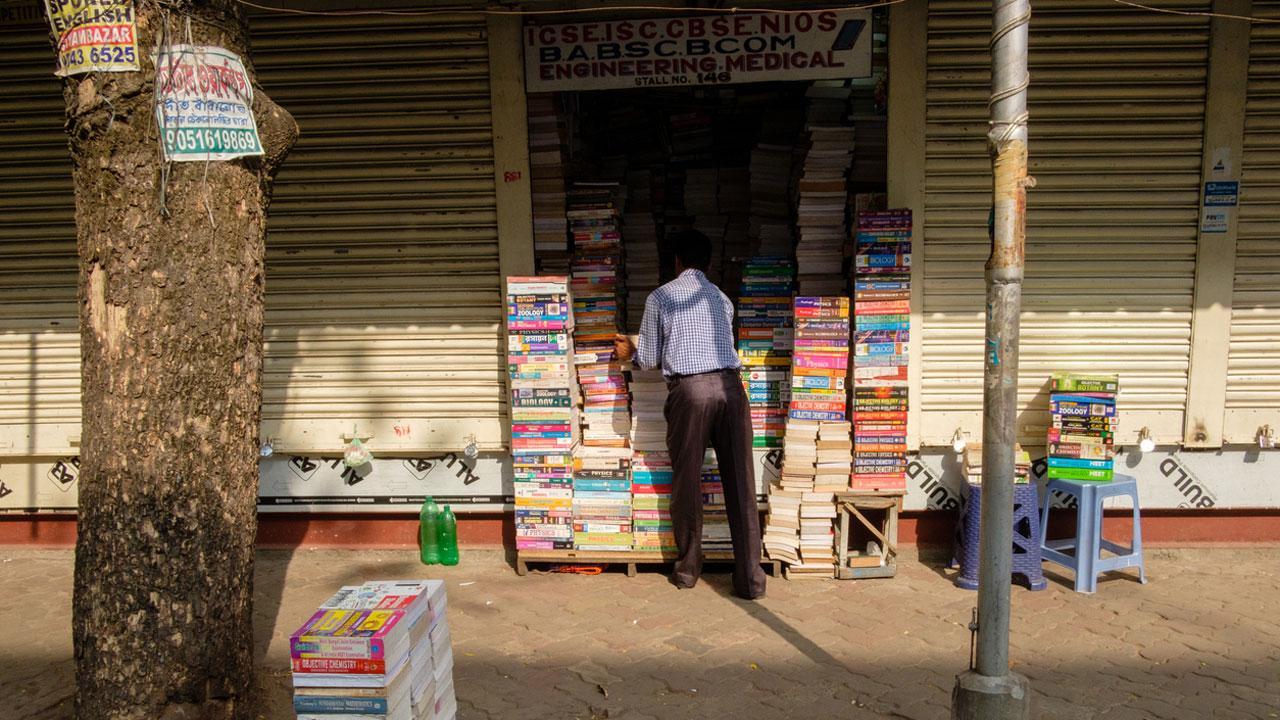Bookstores and booksellers around the city can play a key role in keeping the common bibliophile in a balanced mindspace in these locked-in times that have returned to haunt us

Representation pic. Pic/iStock
Last year in April as most of India was learning to live the ‘new normal’ life, in a visionary move, the state government of Kerala, decided to keep bookstores open for two days of the week because it believed that reading books was necessary for the mental health of the public. Even shops selling educational books were allowed to operate.
ADVERTISEMENT
April 23 is observed by UNESCO as World Book and Copyright Day to mark the death anniversaries of three big daddies of literature - William Shakespeare, Miguel de Cervantes and Inca Garcilaso de la Vega. The following day is Independent Bookstore Day – an annual affair in the US – but now observed by bookstores across the globe as a mark of solidarity towards their ilk.
These back-to-back dates hit a nostalgic note, especially in these times where we crave for the enrichment that can only come from entering a physical bookstore or browsing secondhand titles on a footpath. It was time to write a mini-tribute to these tactile experiences, and their life-changing impact.
Introduction to a dream world
As a school going teen, I recall my access to libraries as a fun, weekly affair. Some of us friends would pore over collections of Nancy Drew mysteries, Sir Conan Doyle’s fascinating whodunits or Archie’s next mad Riverdale High Adventure with equal curiosity. The odd fact book or quizzing tome also caught the eye of this trivia nerd. There were no bookstores in my suburb, Mulund, and so the well-stocked Paras Circulating Library did us a world of good as we gradually introduced to the many worlds outside our charming neighbourhood. Our vocabulary was introduced to an array of terms and timelines – ranging from Pop Tate’s club soda, to what life must have been like in 19th century London. An inspiring English school teacher played her part too; her enviable bookcase had Dostoevsky, Uris, Miller, Shakespeare, and so many others.
By then, my mother had already opened our minds to the collections of Reader’s Digest books – a delightful universe of knowledge that became our Google search for everything. Its reference books were a treasure trove, packed with wonderful illustrations, crisp information and easy-on-the-eye layouts that wasn’t off-putting for the impressionable reader, keen to grasp beyond the daily newspaper and The World This Week [remember that?] superbly packaged weekly capsule. As college corridors beckoned, our world opened up a bit more to a wider access of books. The iconic secondhand booksellers at King’s Circle are an institution in themselves. It was a dream-come-true for any cash-strapped collegian who loved books, holding on to every paisa of their pocket money. I can recall many long-drawn bargaining battles with them; they won some, we won a few. And yet, without fail each time we’d revisit, they would source titles from our wishlist. Soon enough, our adventurous lives took us to the Mecca for booklovers – Strand Book Stall. I recall my first visit as a 17-year-old. A bunch of us took the train to VT for a movie at Sterling but the show was sold out, so we ambled around Fort and ventured inside. Mr Shanbhag would patiently answer our every inane query about a suitable pick. My respect for Bombay’s irreplaceable book guardian increased with every visit there. There was Smoker’s Corner, another gem in the vicinity located at the entrance of Botawala building. Their collection of rare UK publications and quirky illustrated titles grace my bookshelf to this date. Like Mr Shanbhag, Suleman Botawala knew every book inside out.
Coffee and books
By the time professional life came calling, bookstore chains sprung up everywhere; even my suburb boasted of one. It was the new cool place to be seen in – buy a book, sip on a coffee; it looked right. It might have felt fashionably ‘It’, yet the feet took me back to Strand for serious book-shopping. Fort’s pavement booksellers had also caught our eye for their eclectic lists. In the mid-2000s, I was commissioned to write a fact book on the city. That proved to be another turning point. The library inside the Asiatic Society building intimidated and wowed. Within these hundreds of rows sat probably one of the widest collections of titles under one roof; it spanned centuries that were intertwined with the city’s evolution. The deafening silence, occasionally interrupted by creaking sounds of researchers or academics walking on its wooden floors; the pigeon poop that would greet me on turning a page of an 1873 original; the discoveries in the microfilm section, all of it made me treasure those memories. This last decade saw the emergence of Kitab Khana, Trilogy, Title Waves, as well as reading spaces like Leaping Windows and MCubed Library, giving much-needed leg-up for the city’s bibliophiles.
The tough silence
Today, books sit untouched in these sanctuaries across Bombay. They await their fate, just like the city. One hopes that like the Kerala government, our powers will see merit in reopening them up for public consumption, and, more importantly, for mental nourishment. Here’s a timely quote by American aphorist Mason Cooley to ponder over – ‘Reading gives us someplace to go when we have to stay where we are.’
mid-day’s Features Editor Fiona Fernandez relishes the city’s sights, sounds, smells and stones...wherever the ink and the inclination takes her. She tweets @bombayana
Send your feedback to mailbag@mid-day.com
 Subscribe today by clicking the link and stay updated with the latest news!" Click here!
Subscribe today by clicking the link and stay updated with the latest news!" Click here!







